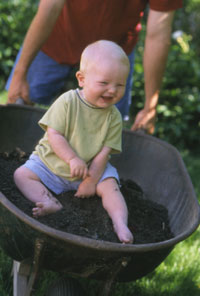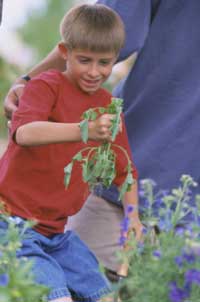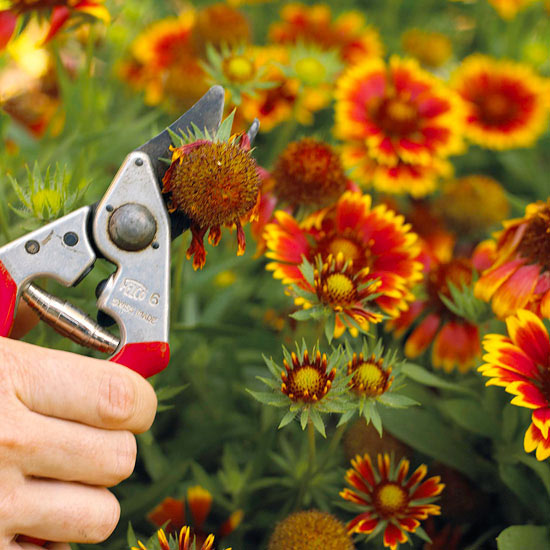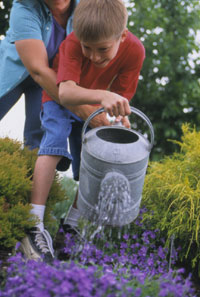






Growing flowers may be easier than raising kids, but the two pursuits have their similarities. Building a good home environment for strong roots, weeding out bad company, giving extra protection at the toddler stage, providing support but more independence as they mature, and making the important link between proper nutrition and strong growth will lead to the pride and satisfaction of guiding your young upstarts to blooming maturity.
continue reading below
1. Take the time to prepare the proper environment before new plants arrive.
Good soil preparation is the single most important thing you can do for your flowers. Loosen soil to at least 6 inches, add organic matter (such as peat moss, compost, or manure), and mix well. Rake to level. Soil preparation can be a fun job, one that increases the anticipation of new life, much like preparing the nursery for a new baby.
2. Don't smother new plants with too thick a soil blanket.
Most flower seeds should be barely covered; make the soil layer just 1/4 inch thick. Planting flower seeds too deep is a common mistake -- just like new parents who have a tendency to cover a newborn with too many blankets. Seed depth and planting time, critical to emerging new life, are cases where you should refer to expert advice. Read the seed packet; then read it again. The information on the seed packet is like words of advice from a pediatrician or the pages of Dr. Spock.

3. Use fast foods or health foods, but nourish young plants well during growth spurts.
You can feed fast foods to your actively growing plants by adding water-soluble fertilizers to the watering can or a hose-end sprayer. If these fertilizers, heavy with chemical additives, aren't the way you want to nourish youngsters, you may choose to go organic and side-dress with slower acting but healthier compost, fish fertilizer, or manure fertilizer. Serving a home-brewed batch of manure tea is another health food option. Slower acting organic foods may not seem to fit the fast and active life of your adolescent plants, but in the long run you'll build a healthier soil environment for future flower generations.
4. Weed out bad influences when plants are young.
The kind of friends your flowers hang around with at this stage of rapid growth will influence how straight and sturdy they are as adults. Weeds rob your seedlings of nutrients and water and make them look bad. When a good flower garden goes bad, you can often blame the influence of the flowers' weedy companions. Take an authoritative stand and stay in control; set limits, and spend some quality time pulling weeds.

5. Be overprotective at a plant's vulnerable seedling stage.
Once seeds sprout, they are at the vulnerable seedling or toddler stage. At this point, it's your duty to hover over them. Keep the soil moist, but avoid the temptation to fertilize until you see two true leaves. (Those first leaves that emerge are part of the seed itself.) Fertilizing newly sprouted seeds is like trying to feed a pork chop to a newborn: It doesn't go down well and could be harmful. While waiting for the first set of true leaves is like waiting for an infant to get teeth, it's the developmental milestone that signals it's time for a change in diet.
6. Deadhead plants to keep them feeling young.
Once plants flower, keep the color coming by deadheading, or removing, faded flower heads. If your flowering plant blooms and then fades (or starts to look ready for retirement), you can always try to revitalize it by shearing off the faded blooms and one-third of the top growth. Now fertilize. This trick restores the performance and blooming of "past their prime" plants.

7. Offer support as plants mature and grow tall.
Consider some additional support as seedlings turn into gangly adolescent plants. Now is the time to offer forked twigs or other props before plants endure the rainstorms of life. You can also choose to pinch out the center of young flowering plants, such as petunias and fuchsias, to encourage more bushy side growth. Tall delphiniums, sunflowers, and dahlias may need to be tied to stakes. (These pinching and tying techniques are not recommended for raising children, no matter how much you may want to pinch them and tie them down during the rapid development of adolescence.)
8. Plant adoption is an option.
Not all great flower gardens (like families) need to be formed by planting the seed yourself. Adopting transplants from a nursery can be an easier option, or you may want to start the seeds indoors, then carefully transfer them to the nurturing nursery of outdoor soil once the weather has stabilized. No matter where the transplants come from, the first few nights are crucial as the young plants must adjust to a new environment, or harden off. Let them sit outdoors under a covered porch or patio for a few days. Or, if planted, offer a nighttime blanket of protection by covering them with a light sheet or newspaper tents. Think of this hardening-off stage as half-day kindergarten, which helps children make the transition to being away from home all day.
9. Celebrate as perennials graduate.
There may come a time, especially for perennials, when plants need to move. Growing too big for their original home is one sign that you've done your parenting job right. There is no need to feel anxious at this time of separation. Most perennials are easy to divide by pulling the side shoots or baby plants from the mother and transplanting them to a new location. This move will be easier on everyone if you do it on a cloudy day and prepare the new home by loosening the soil and watering well.
10. Don't forget to photograph your full-grown, blooming successes!
Get out the camera and take handsome graduation photos of your beautiful flowers in the prime of their lives. Gather a fresh bouquet to bring indoors, or share the success of plant parenting by giving a vase of fresh-cut victory to your neighbors or coworkers.
Copyright © www.100flowers.win Botanic Garden All Rights Reserved